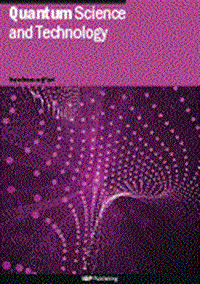通过减轻魔法稀释来解锁早期容错量子计算
IF 5
2区 物理与天体物理
Q1 PHYSICS, MULTIDISCIPLINARY
引用次数: 0
摘要
随着量子计算向早期容错状态发展,量子纠错将在保护量子比特和实现逻辑Clifford操作方面发挥至关重要的作用。然而,逻辑量子位的数量最初仍然有限,这给魔法状态蒸馏等资源密集型任务带来了挑战。因此,必须开发有效的方法来实现非clifford操作,例如小角度旋转,以在这些限制条件下最大化设备的计算能力。在这项工作中,我们引入了缓解魔术稀释(MMD)作为合成小角度旋转的方法,通过使用量子误差缓解技术对给定噪声编码魔术状态的逻辑Clifford电路进行采样。我们探索了我们的方法在二维费米-哈伯德模型模拟中的实用性。我们确定了演化时间制度,其中MMD在最大尺寸的方形晶格所需的噪声编码魔法状态的数量上优于最先进的合成技术。此外,我们证明了我们的方法可以提供一种实用的优势,这种优势可以通过对小角度旋转的资源需求的二次改进来量化。这项工作为支持数百万量子操作的设备的早期容错演示铺平了道路,即所谓的MegaQuOp体制。本文章由计算机程序翻译,如有差异,请以英文原文为准。
Unlocking early fault-tolerant quantum computing with mitigated magic dilution
As quantum computing progresses towards the early fault-tolerant regime, quantum error correction will play a crucial role in protecting qubits and enabling logical Clifford operations. However, the number of logical qubits will initially remain limited, posing challenges for resource-intensive tasks like magic state distillation. It is therefore essential to develop efficient methods for implementing non-Clifford operations, such as small-angle rotations, to maximise the computational capabilities of devices within these constraints. In this work, we introduce mitigated magic dilution (MMD) as an approach to synthesise small-angle rotations by employing quantum error mitigation techniques to sample logical Clifford circuits given noisy encoded magic states. We explore the utility of our approach for the simulation of the 2D Fermi–Hubbard model. We identify evolution time regimes where MMD outperforms state-of-the-art synthesis techniques in the number of noisy encoded magic states required for square lattices up to size . Moreover, we demonstrate that our method can provide a practical advantage that is quantified by a better-than-quadratic improvement in the resource requirements for small-angle rotations over classical simulators. This work paves the way for early fault-tolerant demonstrations on devices supporting millions of quantum operations, the so-called MegaQuOp regime.
求助全文
通过发布文献求助,成功后即可免费获取论文全文。
去求助
来源期刊

Quantum Science and Technology
Materials Science-Materials Science (miscellaneous)
CiteScore
11.20
自引率
3.00%
发文量
133
期刊介绍:
Driven by advances in technology and experimental capability, the last decade has seen the emergence of quantum technology: a new praxis for controlling the quantum world. It is now possible to engineer complex, multi-component systems that merge the once distinct fields of quantum optics and condensed matter physics.
Quantum Science and Technology is a new multidisciplinary, electronic-only journal, devoted to publishing research of the highest quality and impact covering theoretical and experimental advances in the fundamental science and application of all quantum-enabled technologies.
 求助内容:
求助内容: 应助结果提醒方式:
应助结果提醒方式:


